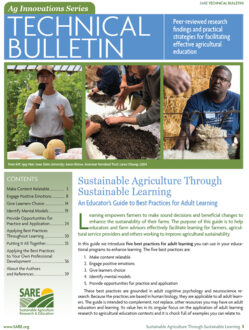Alia-Klein, N., G. Gan, J. Bezek, A. Bruno, T.F. Denson, T. Hendler et al. 2020. The feeling of anger: From brain networks to linguistic expressions. Neuroscience & Biobehavioral Reviews 108: 480–497.
Brand, S., T. Reimer and K. Opwis. 2007. How do we learn in a negative mood? Effects of negative mood on transfer and learning. Learning and Instruction 17(1): 1–16.
De Hooge, I.E., P.W.J. Verlegh and S.C. Tzioti. 2014. Emotions in advice taking: The roles of agency and valence. Journal of Behavioral Decision Making 27(3): 246–258.
Eckert, E. and A. Bell. 2006. Continuity and change: Themes of mental model development among small-scale farmers. Journal of Extension 44(1), article 1FEA2.
Eckert, E. and A. Bell. 2005. Invisible force: Farmers’ mental models and how they influence learning and actions. Journal of Extension 43(3), article 3FEA2.
Ericsson, K.A. 2006. Protocol Analysis and Expert Thought: Concurrent Verbalizations of Thinking During Experts' Performance on Representative Tasks. In K.A. Ericsson, N. Charness, P.J. Feltovich and R.R. Hoffman (Eds.), The Cambridge Handbook of Expertise and Expert Performance (p. 223–241). New York, NY: Cambridge University Press.
Ericsson, K.A. 2008. Deliberate Practice and Acquisition of Expert Performance: A General Overview. Academic Emergency Medicine 15(11): 988–994.
Flannagan, K.M. and H. Addy. 2019. Introverts are not disadvantaged in group-based active learning classrooms. Bioscene: Journal of College Biology Teaching 45(1): 33–41.
Fredrickson, B.L. 2004. The broaden and build theory of positive emotions. Philosophical Foundations of the Royal Society of London 359(1449): 1367–1377.
Galvin, K. and collaborators. (2007). Fluorescent Tracer Manual: An educational tool for pesticide safety educators. University of Washington Pacific Northwest Agricultural Safety and Health Center, Seattle, WA.
Hansen, B.G. 2015. Financial extension that challenges farmers’ thinking in discussion clubs helps farmers improve their problem solving abilities. Agricultural Systems 132: 85–92.
Hill, N.M. and W. Schneider. 2006. Brain changes in the development of expertise: Neuroanatomical and neurophysiological evidence about skill-based adaptations. In K.A. Ericsson, N. Charness, P.J. Feltovich and R.R. Hoffman (Eds.), The Cambridge Handbook of Expertise and Expert Performance (pp. 653–682). New York, NY: Cambridge University Press.
Hoffman, W., B.J. Schmeichel and A.D. Baddeley. 2012. Executive functions and self-regulation. Trends in Cognitive Sciences 16(3): 174–180.
Jabbour, R., S. Zwickle, E.R. Gallandt, K.E. McPhee, R.S. Wilson and D. Doohan. 2013. Mental models of organic weed management: Comparison of New England U.S. farmer and expert models. Renewable Agriculture and Food Systems 29(4): 319–333.
Jones, N.A, H. Ross, T. Lyman, P. Perez and A. Leitch. 2011. Mental models: An interdisciplinary synthesis of theory and methods. Ecology and Society 16(1): 46.
Kuhbandner, C. and R. Pekrun. 2013. Affective state influences retrieval-induced forgetting for integrated knowledge. PloS ONE 8(2): e56617.
Leotti, L.A., S.S. Iyengar and K.N. Ochsner. 2010. Born to choose: The origin and value of the need for control. Trends in Cognitive Science 14(10): 457–463.
Lindenberger, U. and M. Lövdén. 2019. Brain plasticity in human lifespan development: The exploration–selection–refinement model. Annual Review of Developmental Psychology 1: 197–222.
Luckin, R., E. Bains, M. Cukurova and W. Holmes. 2017. Solved! Making the case for collaborative problem solving. London, England: Nesta.uk.org.
Metcalfe, J. 2017. Learning from errors. Annual Review of Developmental Psychology 68: 465–489.
Murayama, K., K. Izuma, R. Aoki and K. Matsumoto. 2017. "Your choice" motivates you in the brain: The emergence of autonomy neuroscience. In S. Kim, J. Reeve and M. Bong (Eds.), Recent Developments in Neuroscience Research on Human Motivation Volume 19 (pp. 95–125). Bingley, UK: Emerald Books.
Oh, S., J.Y. Lee and D.K. Kim. 2020. The design of CNN architectures for optimal six basic emotion classification using multiple physiological signals. Sensors 20(3): 866.
Sarathy, V. 2018. Real world problem-solving. Frontiers in Human Neuroscience 12: article 261.
Schlichting, M.L. and A.R. Preston. 2014. Memory reactivation during rest supports upcoming learning of related content. PNAS 111(44): 15845–15850.
Sloan, D. and C. Norrgran. 2016. A neuroscience perspective on learning. Chemical Engineering Education 50(1): 29–37.
Talarico, J.M., D. Berntsen and D.C. Rubin. 2009. Positive emotions enhance recall of peripheral details. Cognition and Emotion 23(2): 380–398. Tyng, C.M., H.U. Amin, M.N.M. Saad and A.S. Malik. 2017. The influences of emotion on learning and memory. Frontiers in Psychology 8: article 1454.
